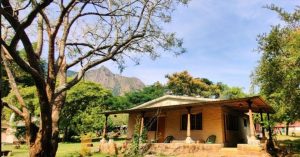Visiting Rajasthan in Winter? This Unique Mud Homestay Is Run by a Family of Durrie Weavers
Chhotaram Prajapat, whose family has woven 'dhurries' in Rajasthan for over seven centuries, launched a mud homestay business inspired by UK tourists. They now welcome guests to their Salawas village home, providing authentic experiences while championing local crafts and culture.
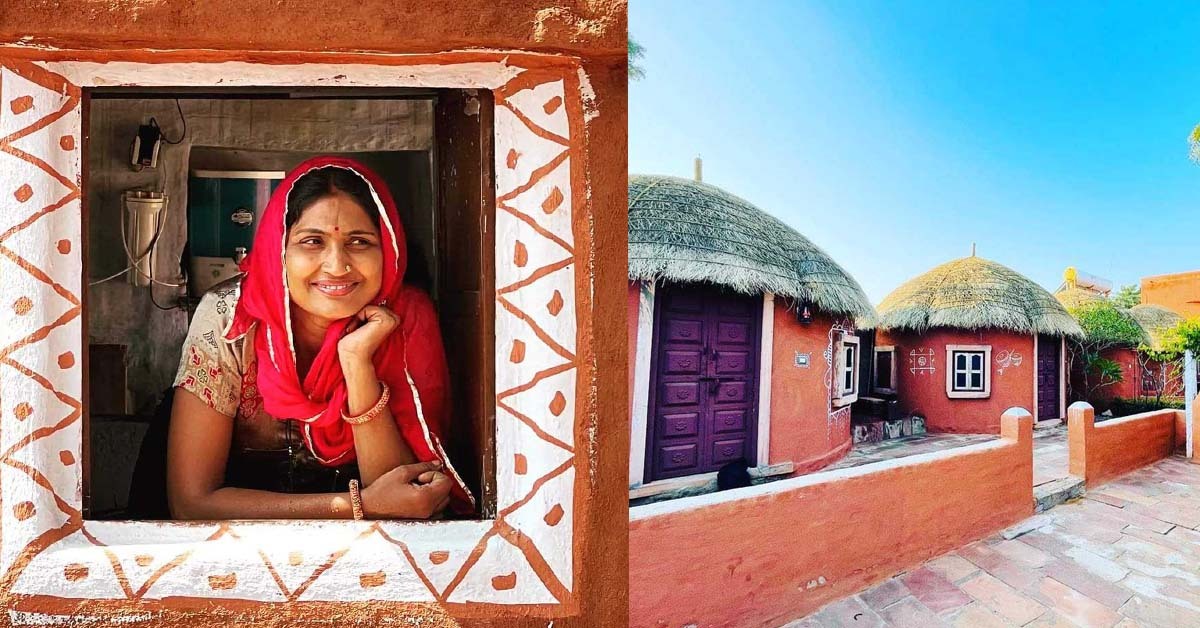
In the year 2009, a couple from the UK, Brad and Lucy, were on the brink of the final leg of their Rajasthan trip. The fabled city of Jodhpur was the destination of choice. Armed with postcards that boasted the magnificent forts and camera pictures that showed off the colourful bazaars, the couple was ready for more such authentic Rajasthani experiences.
A stay in a Rajasthani home would be the icing on the cake.
The first place they came across in Jodhpur was the village of Salawas which prides itself on the legendary dhurrie making (handwoven floor coverings whose designs are inspired by the state’s culture). Lucy could hardly contain her excitement on meeting Pukhraj ji’s family whose ancestors have been engaged in the artisanal craft for over seven centuries.
Hours later, her arms were loaded with purchases of woven dhurries for her friends back home. It was time to leave. But the rustic village with its mud homes and sprawling courtyards had cast a trance on her. She found it impossible to leave this vintage magic for the plushness of a hotel.
As Pukhraj ji’s son Chhotaram Prajapat, who is now in his 30s recalls, the couple showed every intention to stay back with his family.
“We did not know English back then. But Brad and Lucy used sign language to ask us if they could live with us for a few days. We were surprised! Of course not!” It was unheard of for foreigners to live with the villagers at the time. “What would we serve them to eat? Where would they sleep? All we could offer them was charpais under the open sky. We couldn’t compete with the luxuries of a hotel.”
But Brad and Lucy weren’t ones to give up. The next morning they returned with a gentleman who was fluent in both English and Rajasthani dialect. “He communicated their request to us again, and told us they weren’t looking for luxuries but for an authentic Jodhpur experience in a mud home and sleeping under the skies. Our home was perfect.”
And so, the couple were welcomed into Pukhraj ji’s home for the next 15 days. And, unknown to Chhotaram, this would set the precedent for his dream homestay business one day.
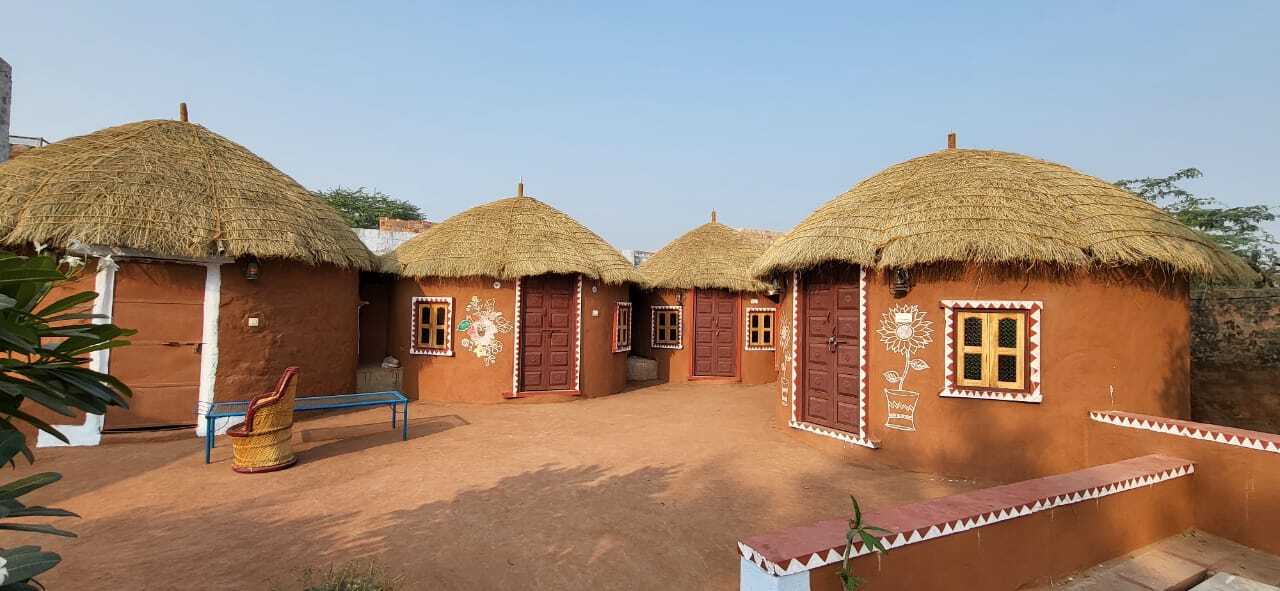
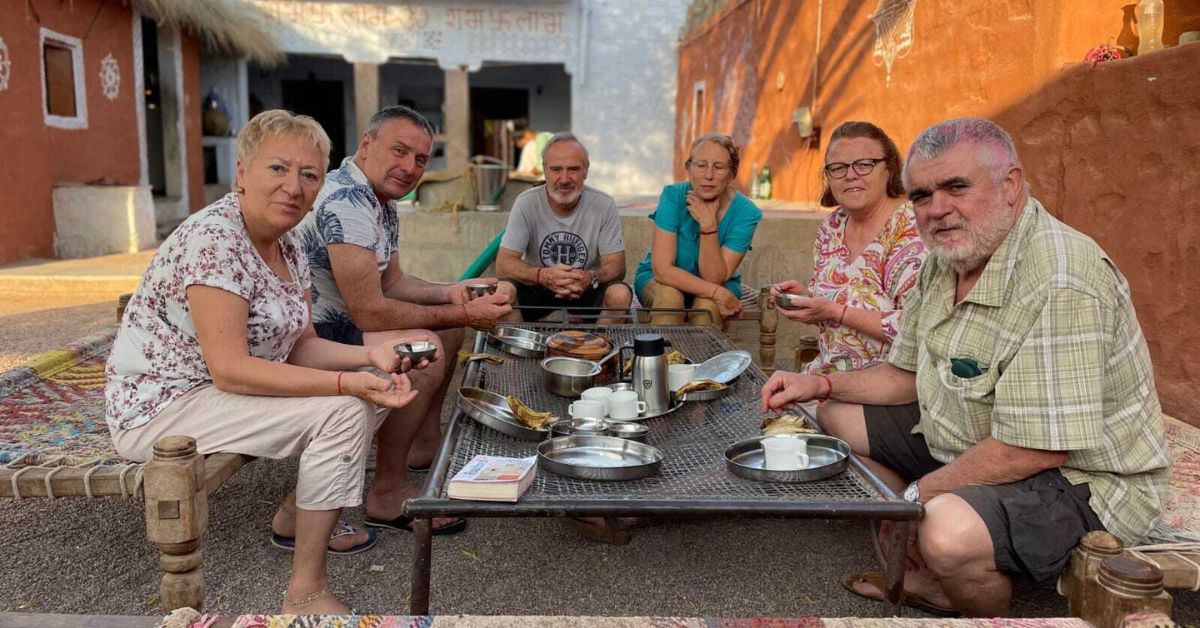
A business is born of serendipity
Today, the Chhotaram Prajapat Homestay is the place guests head to for a “mesmerising experience” in Jodhpur. At a distance of 20 km from the heritage city, the homestay’s contemporary dwelling ensures that it matches the local cultural experience that guests flock to Jodhpur for.
So, how did Brad and Lucy’s stay influence this idea?
Tying the two stories together, Chhotaram says it was a work of the Universe.
Neither of the two parties were the same following the fortnight the couple spent at the home. As for the couple, they were treated to a world very different from their own. They slept under the stars — “just like gypsies”, chuckles Chhotaram, ate the local Rajasthani food — “and cried because of the spice” — and were thoroughly amused at how water is boiled and cooled before it is served.
Chhotaram’s family meanwhile picked up a few English words and learnt of cultures on foreign shores, way beyond the confines of the humble village. Fifteen days came to an end quickly, and Brad and Lucy headed back to the UK with a promise to return. Chhotaram was under the impression that this had been a one-off incident, but he couldn’t be more wrong.
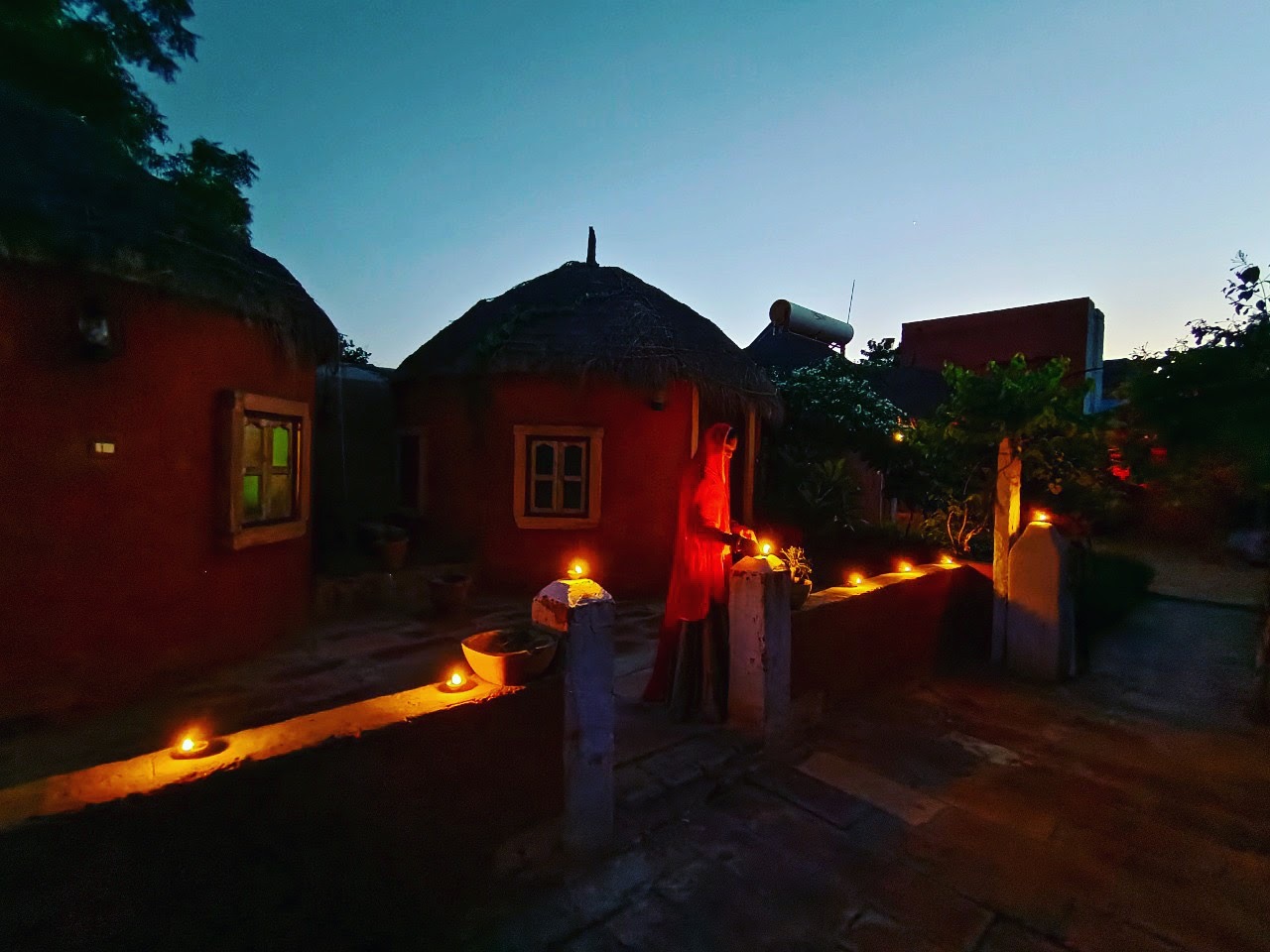
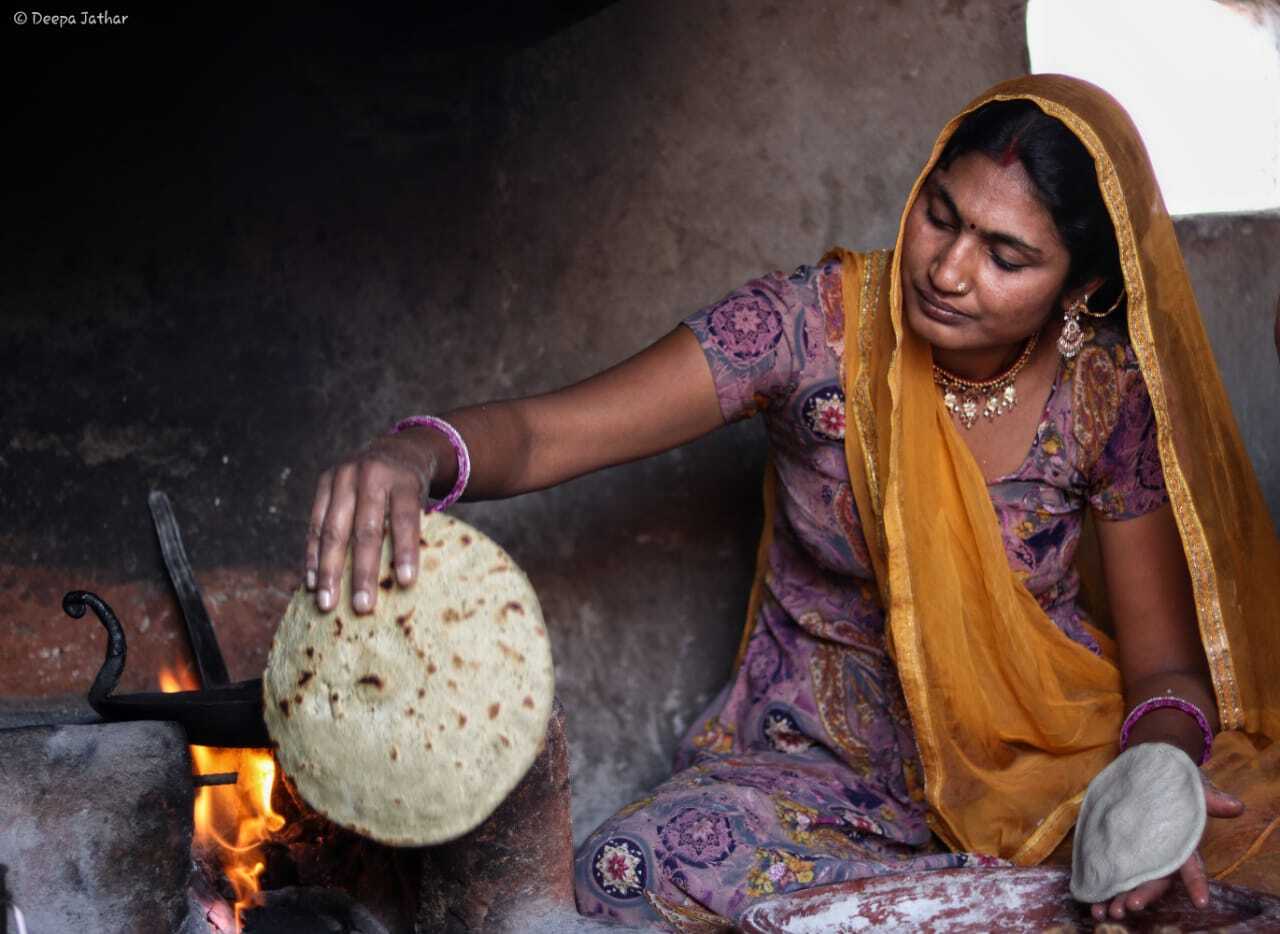
In a couple of months, the locals of the village of Salawas could be heard guiding many foreigners to the ‘mud home’, which was Chhotaram’s. Friends of Brad and Lucy, these people had heard of and seen pictures of the couple’s experience and were here to witness it for themselves. This time, Chhotaram was more than happy to oblige.
“Having hosted Brad and Lucy before, we were familiar with the spice that people abroad could tolerate and so we customised the food according to that.” Meanwhile, Chhotaram’s English vocabulary had expanded and he was thoroughly enjoying his talks with the guests.
One such conversation in 2011 was the most significant, he says.
He observed one of his guests, Brad’s friend, working on a laptop with a dongle for connectivity. He’d been staying with Chhotaram for three months at the time. “We got talking and he suggested that I open up my home for tourism officially. Like a homestay.”
A stranger to the internet and running a business, Chhotaram laughed it off. But the guest was persistent. “I’ll help you set it up,” he promised. “People love your home over a hotel because of the local experience you give.”
Intrigued at how this would work, Chotaram agreed. In a matter of minutes, the guest had registered the home on a travel website and created an email address for Chhotaram through which he could access bookings.
Thus was born the Chhotaram Prajapat Homestay. “I came up with the name on the spur of the moment. I said ‘name it after me’,” he shares.
From paying Rs 700 to a local cyber cafe to access the internet for bookings and buying a computer “that took two hours to reply to an email” to now accepting bookings at the click of a button, Chhotaram has come a long way.
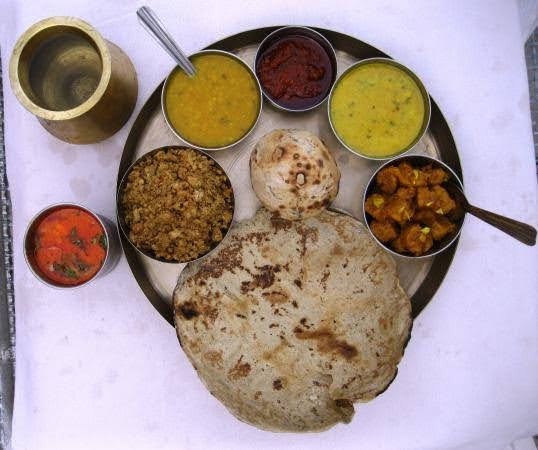
Weaving a successful venture
As the influx of guests increased, Chhotaram’s home was no longer sufficient to accommodate them. And thus, the weaver began building traditional huts near his home. Today, 10 of these stand shoulder-to-shoulder, each complete with a western bathroom, which has cold and hot water, and other amenities excluding televisions and air conditioning.
The family wants to preserve the antique charm of the homestays.
Whilst here, guests are encouraged to come watch the art of dhurrie making. “We earn our daily bread from this business only. Earlier, we used to serve the noble families. We would make dhurries for maharajas and landlords. As time passed, our families got involved in other businesses but were badly exploited by the businessmen.”
It was then, in 1986, that Pukhraj ji decided to take matters into his own hands. “My father set up a co-operative with 45 families and started to sell directly from the village. This eliminated the middlemen,” says Chhotaram.

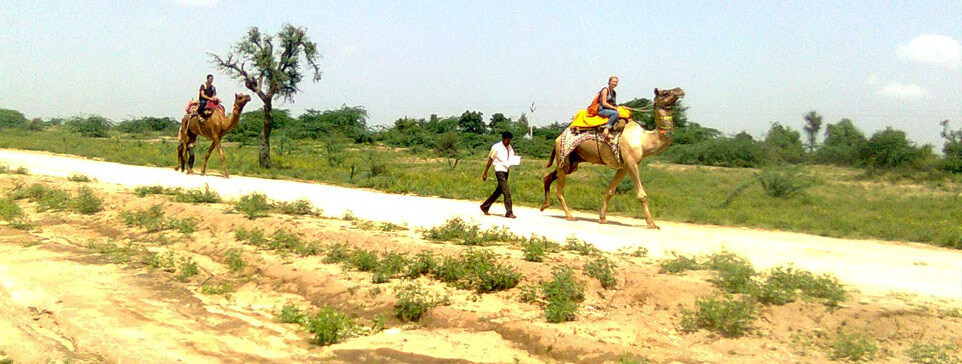
And today, Salawas is a thriving village for the craft. Made using the interlock weaving technique, which is not practised in many places in the world, the dhurrie making in this village is famed far and wide.
But retaining a craft is not easy, he points out. “It is challenging because new generations are not interested in the craft. No one wants to be an artist after getting an education. Everyone wants to be a doctor. One average size dhurrie takes around a month to complete and is sold for Rs 10,000. It is hard work,” he adds.
That being said, Chhotaram is hopeful that things will improve.
While he shows his guests around the weaving rooms, he also takes them on the camel safari through the village. There are also jeep safaris to enjoy that take you through the bazaars, trips to the Sardar Samand Lake popular for birdwatching, and the local crafts of the village.
Keep your stomach light, though. The food at the Chhotaram Prajapat Homestay is a feast for the eyes and mouth.
“We don’t have posh suites, but our small dwellings match the genuineness of all comforts and that homely feel. We also don’t offer multi-cuisine but the food is just mouth-watering made with extra care, and we are famous for the taste of our spices,” says Chhotaram, whose wife is in charge of the cuisine and also conducts cooking classes for the guests where she teaches them to brew a feast on the open fire that uses cow dung for fuel.
Dusk is settling and its blue tinge complements the city palette. As the two shades find their sync in each other, a man walks towards the mud huts in the village of Salawas. Accompanying him is a tourist from foreign shores. Chhotaram Prajapat has found his new guest.
Edited by Pranita Bhat
If you found our stories insightful, informative, or even just enjoyable, we invite you to consider making a voluntary payment to support the work we do at The Better India. Your contribution helps us continue producing quality content that educates, inspires, and drives positive change.
Choose one of the payment options below for your contribution-
By paying for the stories you value, you directly contribute to sustaining our efforts focused on making a difference in the world. Together, let's ensure that impactful stories continue to be told and shared, enriching lives and communities alike.
Thank you for your support. Here are some frequently asked questions you might find helpful to know why you are contributing?







